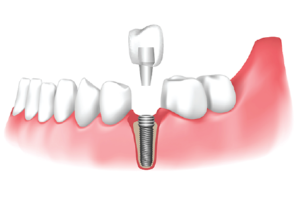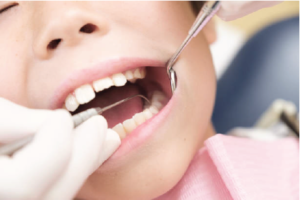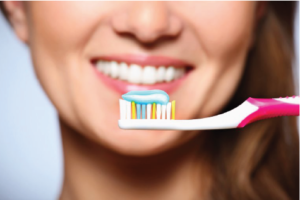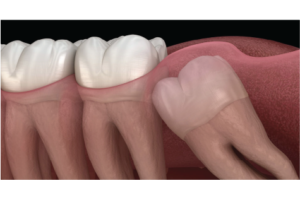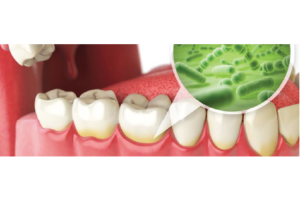ARE YOUR TEETH SENSITIVE?
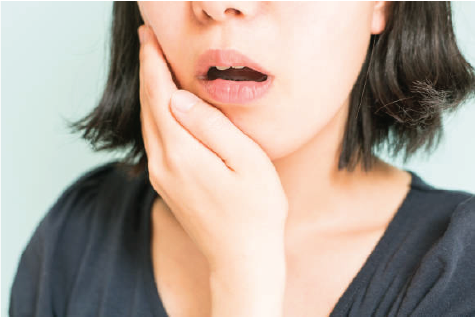
Have you ever encountered a sudden, sharp streak of pain while eating an ice cream, or sipping on some hot coffee or soup? If yes, you may have tooth sensitivity.
Teeth sensitivity or “dentin hypersensitivity” is a sensation or discomfort in your teeth in reaction to certain triggers. It may be a transient or recurrent condition and may involve one tooth, multiple teeth or all teeth.
What causes teeth sensitivity?
The interior of your tooth is essentially made up of a layer of dentin which contains tiny tubules connected to nerve endings. This dentin is covered by a hard protective layer called enamel in the crown portion and cementum in the root portion of the tooth. When these protective layers of dentin are worn down, external stimuli such as hot, cold, sweet or acidic foods, cold air or even brushing and flossing can trigger the nerve endings thereby causing pain.
Factors that contribute to teeth sensitivity:
–Wrong brushing technique: Brushing too vigorously or using a hard-bristled toothbrush can wear down enamel and expose the dentin.
–Acidic Foods: Consumption of acidic foods and beverages can induce enamel erosion.
–Gum recession: Gum disease can result in gum tissue pulling away from the tooth exposing the root surface.
–Grinding or clenching of teeth: This can cause the enamel to wear away which over time can expose the underlying dentin.
–Tooth decay, chipped teeth or old fillings: In these cases, you are likely to experience sensitivity in one particular tooth or region in your mouth.
–Transient sensitivity after dental treatment: This is particularly felt after procedures such as crowns, fillings and teeth whitening.
–Medical conditions: Gastric acid regurgitation in the mouth in conditions such as gastroesophageal reflux disease may result in enamel erosion.
Treatment of sensitive teeth:
Your dentist will help you identify the most likely cause of sensitivity. Depending on the circumstances, your dentist may recommend:
Desensitizing toothpaste: It includes substances that tend to block the transmission of sensation from the tooth surface to the nerve. Usually, several applications are required before the sensitivity is reduced.
Fluoride gel application: Your dentist may use fluoride in sensitive areas of your teeth to strengthen the enamel and reduce the transmission of sensations.
Dental bonding or crowns: These procedures can be used to correct defects due to vigorous brushing, cavities or some fractures of teeth.
Surgical gum graft: When the gum tissue has been lost from the tooth root, a gum graft can cover the exposed root and reduce sensitivity.
Root canal treatment: In severe sensitivity cases where other treatment modalities have been ineffective, your dentist may suggest root canal therapy.
Tips to prevent teeth from becoming sensitive:
- Use a soft-bristled toothbrush to brush your teeth twice a day. Instead of vigorous or harsh scrubbing, use gentle strokes. Also, avoid the use of abrasive toothpastes.
- Don’t brush right after you eat. Some foods and drinks may soften your teeth’s enamel. Give it at least an hour before you brush.
- Avoid highly acidic foods and beverages. When you’re having carbonated drinks, use a straw to reduce contact with your teeth. Drink water to balance the acid levels in your mouth after eating or drinking acidic substances.
- Ask your dentist about a mouth guard if you have a habit of grinding your teeth.
- Maintain good oral hygiene in order to prevent gum disease. Visit your dentist once in six months for a check-up.
Having sensitive teeth is an exceedingly unpleasant and painful affair. Building good habits into your daily oral health routine can go a long way in preventing tooth wear, decay, gum disease, and development of sensitivity. Seeking professional advice from your dentist will help you take the most appropriate action if you are experiencing tooth sensitivity.
Should you replace missing teeth
Should you replace missing teeth? You might think that you...
Read MoreWhy you should take care of your child’s milk teeth
Why you should take care of your child’s Milk Teeth...
Read MoreSimple brushing mistakes to avoid
SIMPLE TOOTH BRUSHING MISTAKES TO AVOID Maintaining good oral health...
Read MoreBe wise about your wisdom teeth
Be wise about your wisdom teeth One major dental milestone...
Read MoreDoes acid reflux from the stomach damage your teeth
Does acid reflux from the stomach damage your teeth? It’s...
Read More
Dr. Paresh Lotlekar is a leading dental practitioner specialising in Periodontology & Oral implantology and the founder of STUDIO32 (studio32india.com), a chain of super speciality dental clinics in Goa.

